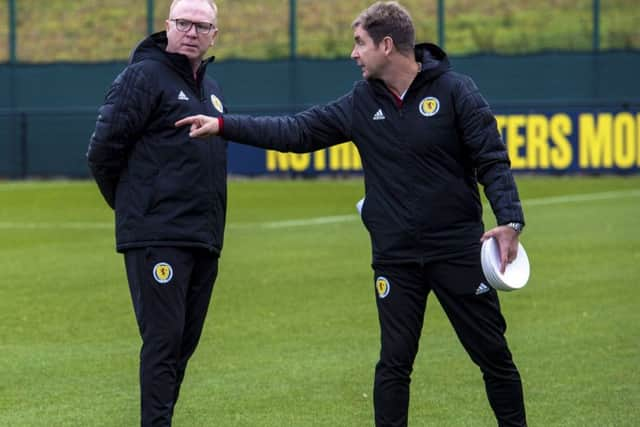Kazakhstan’s plastic pitch not a problem, says Peter Grant
The plastic pitch in Astana appears to have cost Scotland the participation of Bournemouth’s Ryan Fraser and Callum Paterson of Cardiff City. Both are excused the trip to Kazakhstan but will join up with the squad in Italy for next Sunday’s clash with San Marino.
Despite their absence, Grant believes the issues raised over these pitches may be generational and possibly overstated.
Advertisement
Hide AdAdvertisement
Hide Ad“The pitch looks OK,” he said. “It’s not the ideal scenario but, let’s be honest, there’s a lot of these new football pitches, the grass ones, that are harder than the astroturf. I think psychologically, because people have always said the plastic pitch is no good, you can’t play on this, that’s already in our mindset. Whereas, probably in years to come they might all be that way because they’re all starting to make the pitches on grass and sand.


“If you go to some of the training pitches, they’re hard. We were at Aston Villa and they had the highest bounce in British football. They used to do a hammer test on it. Drop a hammer on it. It was the hardest but it was a magnificent pitch to play on. It was rock solid – harder than I would say some of these 4Gs are. But some clubs are on it because the players have insurances they’re covered with because of previous injuries.
“A pitch is a pitch for us. If you ask players if they want to play on a bumpy pitch over there or a level surface, they’ll say ‘I’d rather play here’, and do a bit of training with no bobbles. We’ve not been used to it here. The issue has become not just the players, but the clubs because of insurance regarding previous injuries.
“The finance the boys are getting paid now is a big issue because you get a medical bill for someone being injured, God forbid. But it could happen on grass.
“It puts you in a situation. You could get the same injury, probably worse on grass. I’ve seen worse on grass. It’s just the way it is right now. It’s disappointing but we’d rather have the boys available for the games rather than have them for one and lose them for the second.
“But then there’s also been the scare stories over these pitches – talk of cancer through the rubber crumb and other things. Unfortunately, if someone comes up with one story about it then media and social media picks up on it and it’s everywhere so quickly.”
Yet, it seems there are some players with injury histories who, unlike Fraser and Paterson, aren’t giving Kazakhstan a miss. Players such as John Souttar and James Forrest. Grant doesn’t dispute the fact that both are Scotland-based players who will perform on such surfaces every six weeks in their league environment unlike the English-based Scots, who never play on them.
“I think there are those comfortable on it, others aren’t,” Grant conceded. “John’s a bit younger, he’s been used to training on it since he was a kid. So he’s slightly different. Some other boys, though, have played on it and feel it’s an issue. We make the issue and we create the issue. But it’s not our job to decide. Insurances are a big part of it, the wages players are getting nowadays, and clubs are saying ‘Well, hold on a minute. We’ll maybe get to cover you for that, but we can’t cover you for that.’ We don’t know that, but that could be the situation.”